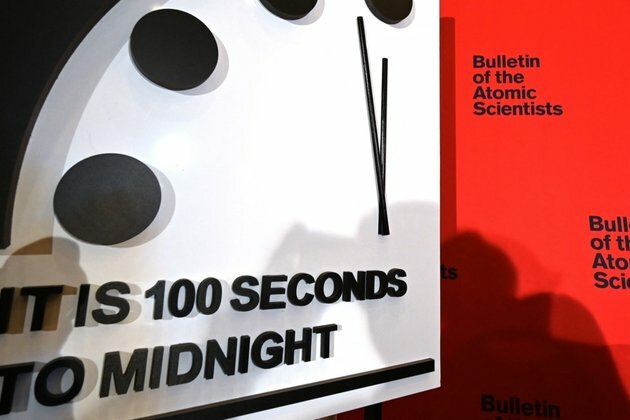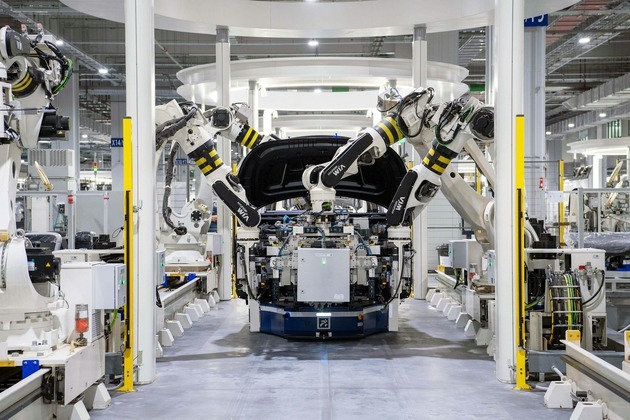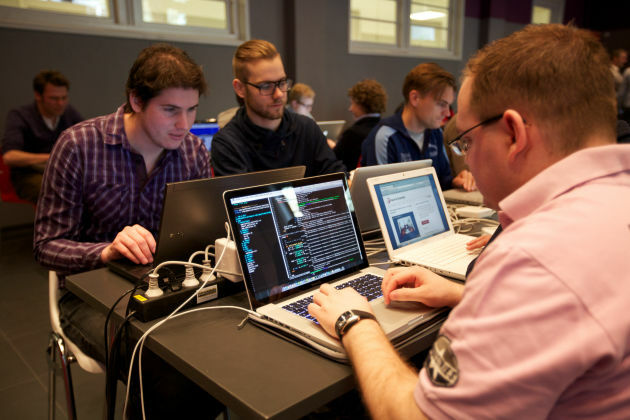Hands of Doomsday Clock Stay Fixed at 100 Seconds to Midnight
Voice of America
20 Jan 2022, 23:35 GMT+10

WASHINGTON - It remains 100 seconds to midnight on the "Doomsday Clock," the famous annual announcement for how close humanity is to extinction.
The Chicago-based non-profit Bulletin of the Atomic Scientists kept the analog hands at the same time for a second year in a row - the closest it has been to midnight during its 75 years.
"The Doomsday Clock is holding steady at 100 seconds to midnight. But steady is not good news. In fact, it reflects the judgment of the board, that we are stuck in a perilous moment, one that brings neither stability nor security," said Sharon Squassoni, co-chair of the Bulletin's Science and Security Board and George Washington University research professor.
Among key concerns, according to Squassoni and others who help set the clock's time, are a lack of stability in the nuclear arms race, tension over Ukraine and nascent efforts to craft strategic stability with China.
"The Doomsday Clock is not set by good intentions, but rather by evidence of action, or in this case inaction," noted Scott Sagan, a Stanford University political science professor.
In addition to concerns about China, Sagan specifically mentioned Iran's nuclear proliferation and North Korea.
"I am very worried about the situation in North Korea, not just because of concerns about North Korean decision making, but because of the risk of an accidental or unauthorized use there," said Sagan in response to a question from VOA's Korean Service.
First unveiled in 1947 - at seven minutes to midnight - amid the increasing chill of the Cold War, the clock was originally intended to warn of the possibility of civilization being destroyed in a nuclear war between the United States and the Soviet Union. Two years later, the hands moved on what had been a static clock - to three minutes to midnight - after the first Soviet nuclear weapons test. In 1953, the hands moved forward again to two minutes to midnight, after the Americans and Russians detonated the first thermonuclear weapons.
Over the decades, the clock has become an indicator of the risk to the planet from multiple potential catastrophes, including climate change and disruptive technologies.
Comments from scientists during Thursday's event on the justification for the setting of the hands ranged from the coronavirus pandemic to the plight of the Uyghurs in China's Xinjiang province.
"While the Doomsday Clock serves as a metaphor, the challenges it represents are very, very real," said Rachel Bronson, president and chief executive officer of the Bulletin of Atomic Scientists, at the start of the annual event held online this year with speakers in different locations due to the coronavirus pandemic.
The farthest the hands have moved from midnight was in 1991 when the clock read 11:43 p.m. following the Threshold Test Ban Treaty entering into force.
The clock has faced some criticism over the decades as an expression of exaggerated angst of politically left-leaning academics and that in recent years its message has drifted far from the dangers of the proliferation of nuclear weapons.
"Most of us have been experiencing feelings of gloom and doom in the last few years, but the Bulletin has been well ahead of the curve," noted Joshua Pollack, editor of The Nonproliferation Review and a senior research associate at the Middlebury Institute of International Studies at Monterey.
"The Doomsday Clock has been set very low for some time now, mainly on account of climate change. It sends an important message. But it also tends to make the clock less useful as a warning device concerning the state of the nuclear arms race," Pollack told VOA.
-

![16x9 Image]()
Steve Herman
Steve Herman is VOA's White House Bureau Chief.
 Share
Share
 Tweet
Tweet
 Share
Share
 Flip
Flip
 Email
Email
Watch latest videos
Subscribe and Follow
Get a daily dose of North Korea Times news through our daily email, its complimentary and keeps you fully up to date with world and business news as well.
News RELEASES
Publish news of your business, community or sports group, personnel appointments, major event and more by submitting a news release to North Korea Times.
More InformationInternational
SectionFlotilla ship prevented from reaching Gaza, passengers and crew detained
The Israeli Navy has intercepted a ship carrying humanitarian aid and a number of activists including Greta Thunberg, Rima Hassan,...
Japan’s 2024 birth rate drops below 700,000 for first time
TOKYO, Japan: Japan's demographic challenges intensified in 2024, with the number of births falling to another all-time low—underscoring...
China bureaucrat bottlenecks over rare earths ripple through industry
BEIJING, China: A little-known office inside China's Ministry of Commerce has become a powerful chokepoint in the global auto and tech...
WWII heroes visit Normandy, say freedom still worth fighting for
OMAHA BEACH, France: Eighty-one years after the D-Day landings, a small group of World War II veterans has returned to the beaches...
China offers secret bounty for suspected Taiwan-linked hackers
BEIJING, China: The public security bureau in Guangzhou, a city in China, has announced a secret reward for more than 20 people it...
European Union jumps to defence of International Criminal Court
THE HAGUE - The International Criminal Court (ICC) has strongly condemned the United States for imposing sanctions on four of its judges,...
Business
SectionTesla faces EV market pressure as May sales slide in Europe
AMSTERDAM, Netherlands: Tesla saw a sharp decline in sales across several major European markets in May, marking its fifth consecutive...
Mercedes prepares for supply breaks as China delays mineral supply
BERLIN/FRANKFURT: Some car parts factories in Europe have stopped production, and companies like Mercedes-Benz are making backup plans...
McDonald’s Snack Wrap returns to US after 9-year hiatus
CHICAGO, Illinois: McDonald's is bringing back its much-loved Snack Wrap in the U.S. starting July 10. The wrap, which includes chicken,...
Dollar General raises full-year profit and sales forecast
GOODLETTSVILLE, Tennessee: Dollar General reported record sales of US$10.44 billion for the latest quarter and raised its full-year...
Electric aircraft lands at JFK as Beta hits major milestone
SOUTH BURLINGTON, Vermont: Beta Technologies has become the first U.S. company to land an all-electric aircraft at an airport in the...
Summer travel slows as Americans hunt for last-minute bargains
WASHINGTON, D.C. Forget bucket lists; this summer, it's all about budget lists. Amid economic uncertainty and a weaker dollar, Americans...














